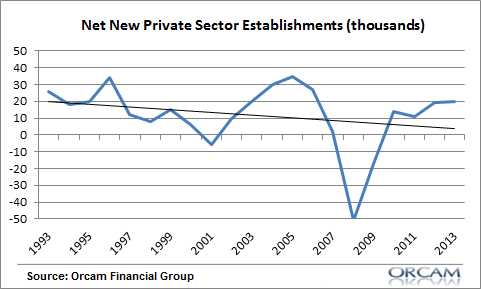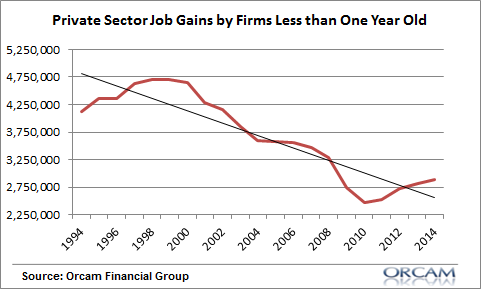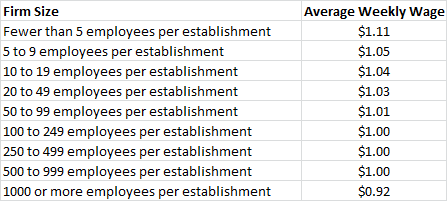Seth Godin has a thought provoking piece in which he claims he’s “anti-business” and you might be too. The argument basically boils down to this:
The term anti-business actually seems to mean, “against short-term waste, harmful side effects and selfish shortcuts.” Direct marketers were aghast when people started speaking out against spam, but of course, in the long run, ethical direct marketers came out ahead.
If anti-business means supporting a structure that builds a foundation where more people can flourish over time, then sign me up.
I don’t think this is what people worry about when they express concern over “anti-business” policies. I think what most people are worried about is that “anti-business” policy and mentality will reduce the potential positive impact that corporations have on the world. And importantly, much of the positive impact from businesses comes from new firm formation. Stick with me here while I elaborate on that key point….
This is a very broad and complex discussion that I can’t do justice to here, but I do want to make a few basic points about why being “anti-business” is potentially harmful.
- First, “businesses” are just entities that shelter individuals in the pursuit of enterprise. When we think of “businesses” we tend to have this vision of big bad inefficient profit seeking institutions. But the reality is that most “businesses” are nothing like this. Of the 27MM firms that existed in 2008, 79% of them had no employees. Just 5% of them had more than 10 employees. In other words, the vast majority of businesses are small businesses and sole proprietorships. They are not Google, Goldman Sachs, IBM or Microsoft. “Businesses” are your neighbor, the coffee shop around the corner, the consultant you hire to fix your computer. The business they own is little more than a legal shelter. Most businesses are comprised of people doing simple things in the pursuit of providing a useful good or service to others. Therefore, in a broad sense, being anti-business actually means you’re anti SMALL business.¹
- Second, if we accept that entrepreneurship and new business competition is a good thing for the economy (not exactly a controversial view in my opinion) then we should also accept the idea that any reduction in new business formation is potentially harmful to the economy. And in fact, the USA is showing signs that this is precisely what’s occurring. Over the course of the last 20 years there has been a decline in the average number of new businesses formed:
- But this is far from the most worrisome part of the “anti-business” mentality. An anti business mentality could lead to an anti jobs mentality. Since most firms are small businesses it shouldn’t be surprising that most of the jobs in the economy come from these small businesses. According to the SBA 64% of net new jobs come from small businesses. When we look at the contribution of new jobs from young firms we see an alarming decline in the last 20 years:
- It gets worse though. If you’re anti small business then you’re also against rising wages. That’s right. If we look at the BLS data on wages between firm sizes it shows a clear correlation between average weekly wages and average firm size.² Large firms tend to pay their employees far worse. And this makes sense given that new entrants have to compete at a higher wage to attract what is inherently less secure employment. In other words, if you’re “anti-business” you’re actually anti small business and if you’re anti small business then you’re anti higher wages. This is a key contributing factor to the “stagnant wage” debate. The reduction in new business formation and new business employment means average wages are lower because the status quo is essentially being maintained.
I think Godin intends to be clearer in his explanation when he makes this “anti business” point. I think he means that he’s anti BIG business. And that might be a very valid point. After all, as he correctly states, it is established firms that will tend to be in favor of the status quo. And the status quo is precisely what we should be worried about. After all, it is the new entrants to the economy that produce most of the jobs and tend to offer higher paying jobs. It is also these new firms that push the competitive limits and force the larger firms to innovate, invest, and try to hold their market share.
The point is, you probably aren’t anti business. In fact, if you favor entrepreneurship, higher wages and technological and societal advancement then you’re probably vehemently pro business.
¹ https://www.census.gov/econ/smallbus.html.
² https://www.bls.gov/cew/datatoc.htm
NB – There is nothing inherently immoral about capitalism or free enterprise so one should not conclude that being pro business is synonymous with poverty and societal decline.
Mr. Roche is the Founder and Chief Investment Officer of Discipline Funds.Discipline Funds is a low fee financial advisory firm with a focus on helping people be more disciplined with their finances.
He is also the author of Pragmatic Capitalism: What Every Investor Needs to Understand About Money and Finance, Understanding the Modern Monetary System and Understanding Modern Portfolio Construction.



